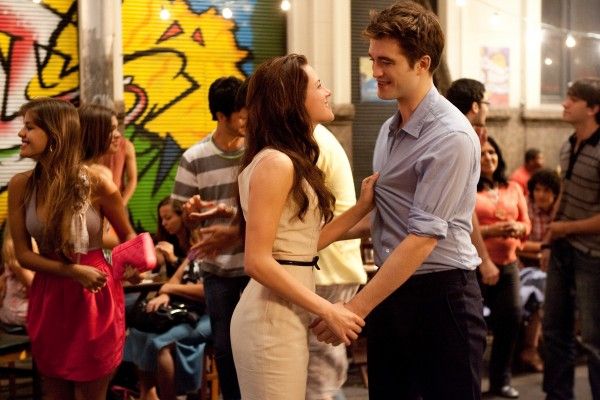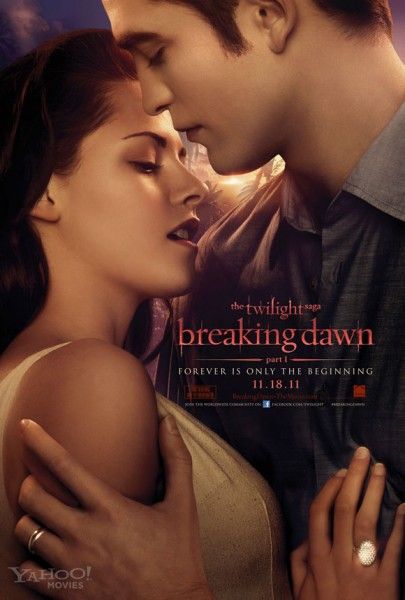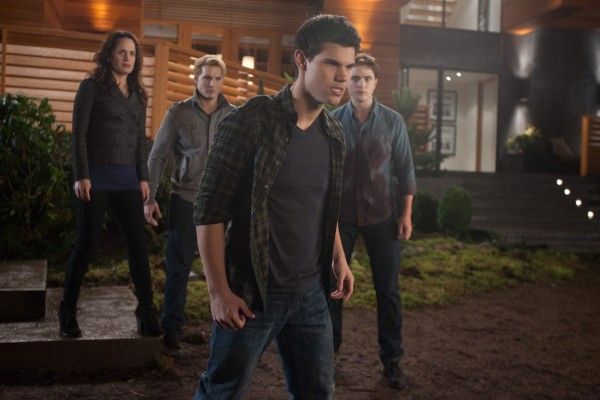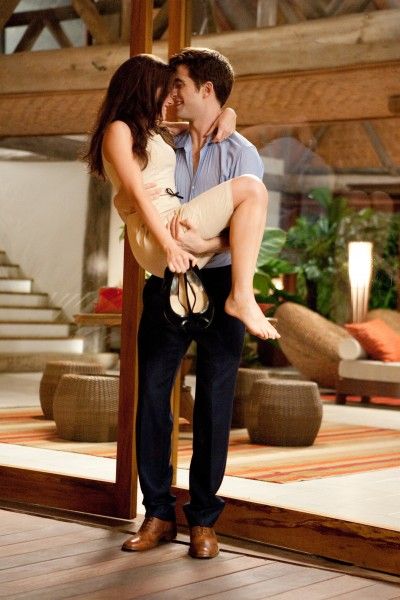Even though the directors of the Twilight Saga films have been different for each installment, screenwriter Melissa Rosenberg has been a constant throughout. With the bulk of her work having ended more than a year ago, she’s already moved on to other writing and producing projects, but is also enjoying the opportunity to relive it for the release of The Twilight Saga: Breaking Dawn – Part 1.
During this exclusive interview with Collider, done at the film’s press junket, Melissa Rosenberg talked about the overwhelming passion of the fans, how wonderful it was to collaborate with director Bill Condon for the final two-part installment, what went into the creative decision to turn Breaking Dawn into two films, how much fun she had as a guest at Bella and Edward’s wedding, and how much she loved getting to introduce all the new characters in Part 2, due out in November 2012. She also talked about the next feature she’s writing, called Earthseed (adapted from a young adult sci-fi novel about a strong, kick-ass young woman), and Afterthought, the NBC series that she’ll be producing. Check out what she had to say after the jump.
Collider: The Twilight films haven’t all come out yet, but you’re finished with filming. What’s it like to be able to step back from them a little bit? Is it weird that it’s all finished, as far as the production goes?
MELISSA ROSENBERG: The bulk of my work ended a year ago or more, so I’ve an opportunity to really move on, and am now deep in the middle of other projects. In some ways, it’s fun to come back and relive it, for the opening of this movie and the last one, in another year.
Do you typically prefer to just go right into the next project?
ROSENBERG: Yeah, that’s how I operate best. I just ignore feelings and jump right into the next thing.
The fans have shown such a tremendous support for this entire franchise. Reflecting back on it now, what’s been the most surprising thing about the experiences that you’ve had with the fans?
ROSENBERG: Their passion is overwhelming. I shouldn’t have been surprised by it, having been a young girl myself, at one point, but their passion and commitment is overwhelming and fantastic and, at times, terrifying. They’re the best audience in the world to write for, unless they hate you. And, I had my haters. We all do.
What was it like to collaborate with director Bill Condon on this, especially with him being such an accomplished screenwriter himself?
ROSENBERG: It was so wonderful. I was pretty tired, coming into the two Breaking Dawn films, having done several, and he just brought such a new, fresh energy to it. Bill is a storyteller, first and foremost. He really brings such a deep sense of theme and character and emotional complexity, and he really pushed me into those areas. Because this is much more of a grown-up story, it required a great deal more complexity. He just kept taking it to the next level and pushing me, and was always there, bouncing off ideas. It was very, very collaborative.
What was the most significant input that he had?
ROSENBERG: Gosh, absolutely everything! It would be impossible to parse out because he’s knitted into every fabric of the storytelling. There were sections that were harder for me to break, so we sat and banged our heads against the wall, specifically on those, particularly the section from the point where she gets pregnant until when she gives birth. That section was a big challenge because basically she’s lying around dying. How do you make that cinematic? How do you keep the energy moving forward? That was a very challenging section, and he really helped me break that and look at that.
Do you think that your experience in television and keeping a show flowing constantly really helped you, as far as doing these films so quickly, one after the other?
ROSENBERG: Oh, absolutely! These are continuing storylines. This is very much like a serialized show, which is what I’ve been working on, for the last 20 years. So, it was a natural for me to shift into a film franchise. I much prefer it to the idea of spending all that time writing a two-hour movie, and then it’s over. If the characters are interesting enough and the world is interesting enough, you want to keep it going and see what happens next for these characters. I love that. The only kind of film I want to write is a story where I can keep on seeing the stories play out. I’m a huge television fan, and I’m a huge continuing storyline fan.
Did you ever worry that you wouldn’t be able to turn this story into two complete films?
ROSENBERG: We had to really look at the fourth book and see, with a very open mind, whether or not there were two movies in it. Obviously, Summit would have loved two movies, but they really made it a creative decision. So, we looked at it and I broke the story into outlines and saw that, with one movie, you would just have to cut out so much that it would be incredibly unsatisfying with just too much rich material left on the plate. Two films gives you some breathing room, particularly in that first movie. The fifth film gets really jam-packed, but it really gives you some room to breathe a little bit in the fourth film, in terms of the storytelling. The movie is fairly tense, but it was nice to have a little room to play.
Was it fun to get to show different sides of these characters and their relationships?
ROSENBERG: It was so much fun seeing Bella and Edward, and getting to play with them, on the honeymoon. Her turning into this seductress was just tons of fun. She’s the aggressor. I love that. Of course, I got to play with some humor with the wedding. I loved writing those toasts. That was fun!
What was it like to be on set during the wedding?
ROSENBERG: I went up for the wedding to be a guest, which was emotional, and incredibly fun and exciting. It was so beautifully done.
Was there a specific scene or chapter that you most enjoyed adapting, either for Part 1 or Part 2?
ROSENBERG: Yeah, definitely the honeymoon. That was fun because they got to be playful. The heaviness was off of them. I was also really looking forward to writing that wedding. I really enjoyed that. For the second movie, getting to introduce all those new characters was great. They’re all so interesting. I loved that.
How big of a challenge was it to bring in so many new characters and service them while not taking away too much from the main story?
ROSENBERG: You have so many different characters that you have to pick and choose. If you have too many, then you don’t give the time to the ones you choose. It’s challenging because the story is ultimately still about Edward and Bella, so it always has to come back to them. I could spend, and did, pages and pages and pages, just having fun with different characters and trading lines back and forth, but then you go, “Oh, what happened to Bella and Edward? Where are they?” So, it always has to come back to them.
What are you focused on now, with features and television? Do you have projects you’re working on, in both mediums?
ROSENBERG: I do, in both. I’ll continue to do both ‘cause I love working in television. I am doing a movie for Paramount, called Earthseed. That’s based on a young adult novel, written in 1983 by Pamela Sargent. It doesn’t have the same fan base [as the Twilight books]. It’s much more obscure. It’s a science fiction story that’s very new territory for me. Even though it’s science fiction, it’s a great human story. It’s about humanity and the human experience, told through the eyes of a very strong, kick-ass young woman, which is always my pull. And then, in television, I’m actually producing. I’ve started a company, called Tall Girl Productions, and we’ve got our first project that is purely producing, not writing, with a writer named Evan Daugherty. It’s for NBC, it’s called Afterthought, and it’s science fiction-ish. That’s fun. And, we have some other television projects, but those are the two that are most on my plate, at the moment.
As a writer yourself, is it difficult for you to just be in the role of producer?
ROSENBERG: Oh, it’s so much easier! I always feel like I should get in there and break the story, but then I’m like, “Oh, wait a minute! I have a writer who’s doing that. I don’t have to do it.” It’s just about continuing to empower the writer. My job is to give him the creative space to do what he does best, and support him in anything he needs. It’s a very different role. It’s a different hat. But, I’ve been doing it for a long time in television, so it’s just shifting that into now purely producing. It’s a different role, but I love it. He has to do the heavy-lifting. I get to come in and do the notes.
What was it about Earthseed that interested you? Does it make it easier for you creatively to not have source material with such a fan base?
ROSENBERG: It does and it doesn’t. When you have a beloved book, you have a little more understanding of what the boundaries and rules are. There’s no suggestion that you just go off and make stuff up. You really need to bring that book to the screen. When you have something that’s less familiar, there’s a little more room to look at where it might take you and allow for it to take you someplace. There’s that pressure. You are a little more hazy on what you should or shouldn’t do.
What was it like to work with Stephenie Meyer on this last films, with her also being a producer?
ROSENBERG: She was always available, even from the beginning. She has always been a great person to collaborate with. I would call her to bounce around ideas, or shoot her an idea. She’s actually a much better producer than I am because she really did allow for me and my process. She steps back and stays out of it, until it’s time for her to register her notes. That’s an amazing thing, for someone who is solely a writer, to so graciously be able to step back and let someone else do what they do, and that’s the mark of a good producer.
As a writer, did you ever think about writing a novel?
ROSENBERG: I would love to! It’s a very different skill set, and I plan on someday utilizing it, but I’ll have to learn how to do it. I don’t assume, because I can write screenplays, that I know how to write a novel. It’s a very different world. There’s a craft involved in storytelling, and it’s a different kind of craft. But yes, someday I will do that. It just might be awhile.
Being on set and also being a producer, have you given any thought to directing?
ROSENBERG: That’s the one thing I’ve never really wanted to do. Directing doesn’t appeal to me. I’m much more in the world of ideas. My husband is a director, and I understand what it takes to direct. It’s a skill set where you have to be able to talk to actors and understand them, and I don’t. It’s a very different way of being in the world, and I much prefer writing and producing.
Has being a part of this whole series taught you anything, as far as your own writing process?
ROSENBERG: Because I work in television, I always knew that I loved working with writers. It’s very collaborative. You’re always in a room full of writers. So, this being my first adaptation, I really got that what I’m doing is collaborating with a writer. Whether she’s in the room or not, it was her words on the page and her world of ideas that I was collaborating with. That really suits me. I’m built for that. I’ve been trained for that, in television. I think that’s how I work best. I discovered that about myself. I always thought I should be someone like Charlie Kaufman, who can go off into a dark room and come up with these incredible, original ideas, and that is what some screenwriters do. Others, like Steve Zaillian – and I’m not comparing myself to Steve Zaillian – just find their inspiration from other sources. I think I fall into that category, and I’m very happy about it.




